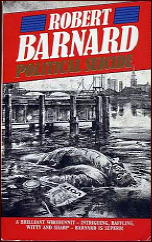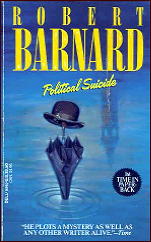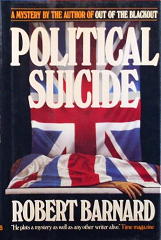Thu 14 Jun 2012

ROBERT BARNARD – Political Suicide. Collins Crime Club, UK, hardcover, 1986. Scribner’s, US, hardcover, 1986. Reprinted several times, including Dell, US, paperback, August 1987; Corgi, UK, paperback, 1988.
I don’t know about you, but the cover just to the right (the Corgi reprint) is one of the ugliest I’ve ever seen on a paperback. It’s not just that it’s in black and white, or that’s incompetently done (I’m not saying that, exactly), but it makes me feel kind of creepy every time I look at it. (And how many covers have you seen rendered in black and white recently?)
It’s not that the book it adorns is not a noir novel, for maybe it is. What Political Suicide is, is a novel about politics, and politicians, British style, and how more downbeat and depressing can a book be than to be about politics and politicians, no matter the country of origin?

Barnard takes the humorous approach, though. His dry wit skewers the profession at every turn, both its pretenses and its pretensions. (No, they are not the same.) But here is the problem, as I see it. Making fun of politicians and their ilk is far too easy. It is as much fun for the reader as I am sure it was for the author, but not for as long, I have a feeling, speaking for myself, of course.
Setting off an election is the presumed suicide of the previous MP of Bootham East, his body fished out of the Thames. The Prime Minister sees no need for an investigation, but Scotland Yard is suspicious.
Sent off to Bootham East, a dismal backwater area of England, is Superintendent Sutcliffe, who is about to retire (only several weeks to go) and he has some vacation time coming.
His investigation is therefore low key and largely unofficial, but he has a keen sense of what’s right and what’s wrong. But another problem with this detective novel, though – as a detective novel – is that it’s a little too low key.

The investigation goes along at a pace that’s slow to begin with, and then manages to go even slower. The antics of the professional politicians — the three primary ones vying for the seat — get a lot more coverage than the sleuthing does. And as a result, our attention (as detective story fans) begins to flag, and we may not be as prepared for the ending when it comes, even though we’ve been keeping a good eye open for the number of pages left.
Speaking for myself, of course. If you are British, you may become more involved with the politics and the politicians (a sorry lot, all), and chances are high that you will have a far better time with this one than I did.
Off on another note, one that I have found strange, Supt. Sutcliffe had a second recorded case: A Scandal in Belgravia (1991), but he may be a participant only in retirement – or in a decidedly minor role. None of the online reviews of the book mention him. If you’ve read that book, can you confirm that he’s in it?
June 14th, 2012 at 4:47 pm
I have a copy of the Dell edition of this book, so I don’t need the British one with the cover that I find so ugly. It’s in nice condition, almost new looking, with no creases in the spine or other noticeable wear. (I tend to read books very carefully.)
So if anyone wants it, I’ll do what I did a short while ago with another book I reported on here but didn’t need an extra copy of. I’ll choose at random from everyone who leaves a comment (if anyone) and if you’re the winner, I’ll send it out to you as a freebie.
You do have to want it, though. Feel free to leave a comment anyway, even if you don’t!
June 15th, 2012 at 5:41 am
I find Barnard’s books relatively uneven, or at least my responses seem to be. I can never tell from the plots whether each one will end up to be my cup of tea.
June 15th, 2012 at 7:10 am
Yes, Sutcliffe was in A SCANDAL IN BELGRAVIA, or so my database tells me, though I don’t remember anything about the book (it’s been 15 years since I read it).
My favorite Barnards: Out of the Blackout, The Masters of the House, The Skeleton in the Grass all come to mind.
I also like his short stories.
June 15th, 2012 at 8:15 am
I read “A Scandal in Belgravia” just a couple of years ago and enjoyed it quite a bit. I didn’t remember the Sutcliffe character, but I did a Google search and came up with a bit of dialogue from the book. I believe he is indeed a relatively minor character, a retired policeman who helps the main character in his investigations.
June 15th, 2012 at 8:46 am
Barnard’s short stories are excellent, usually with a neat little twist at the end. I’ve liked most of his full-length books too, especially the ones featuring Charlie Peace, a black police officer who appears as a supporting character in several books before taking center stage in others.
June 15th, 2012 at 8:54 am
I’m with Rick: Barnard’s work is uneven. I’ve liked about half the Barnard books I’ve read. The other half…not so much.
June 15th, 2012 at 9:23 am
Stephen
From what I could discover about BELGRAVIA, that’s about the only role I could see for Sutcliffe, a retired policeman who helps the main character out. Thanks for the assist on this!
I haven’t read enough of Barnard to know the answer, but why he uses one series character in one book, and another in another, is a question that’s always bugged me.
Insp. Perry Trethowan appeared in five novels, for example, while Insp. Mike Oddie was in seven. Then there is Charlie Peace, whom I didn’t know anything about until Deb mentioned him in Comment #5. He was in nine books, some in overlap with Inspector Oddie. Idwal Meredith was in another two.
Plus many many standalones.
And guess what. I just realized I was using Hubin for all these stats, and CRIME FICTION IV only goes through the year 2000. Most of these totals are going to be higher than the numbers I’ve just given you.
June 15th, 2012 at 9:25 am
For those of you who find Barnard’s novels uneven, as I have also, do you think it is because sometimes his books are “too British” for American tastes?
Or is it simply that some of his work is better than the rest?
June 15th, 2012 at 10:42 am
It helps to know something about British society and culture when reading Barnard’s books. The same could be said for a number of writers, but I think Barnard especially mines a satirical vein based on “Anglo-Saxon attitudes.” For example, one of his novels is titled THE KILLINGS ON JUBILEE TERRACE and is about the murder of actors on a popular soap opera. You can enjoy it without knowing that CORONATION STREET is a long-lived, much-loved (and much-mocked) British soap opera, but it adds something to the reading if you know this.
June 15th, 2012 at 12:46 pm
It’s been way to long since I read a Barnard book! If only I had more time or read faster… Well we slog along as best we can, right?
June 15th, 2012 at 4:01 pm
I’ve read virtually every one of Barnard’s books and short stories and I still look forward to each new title with relish. I wrote a long essay about him for a volume in the Dictionary of Literary Biography. At one point the publishers suspended work on the volume (devoted to modern British crime writers) and I thought “there goes several years of work” — then someone else decided to step in and serve as editor to get the book published. She got in touch with me and asked if I would update my entry on Barnard and I agreed. The challenge was that in the interim he had written about 10 new novels and many short stories. I completed my assignment and the book was eventually published. I had occasion to call Barnard in England (!) to verify some information and that was fun as well. I had met him when he was still teaching English literature at the northern most university in Norway and had lunch with him in the cafe that served as the murder scene in his _Death in a Cold Climate_. He and I are about the same age and for many years exchanged birthday and Christmas cards. Yes, he may be uneven, but he is always a delight.
June 15th, 2012 at 4:31 pm
Thanks, Randy. It sounds as though you’re on Barnard’s wave length, and for whatever reason, I’m not there yet. Echoing Richard’s comment, all I need is time to read more of him, and I don’t suppose I ever will. For people in this county, British wit can be an elusive thing to be in sync with, and I’ve never finished one of their crossword puzzles, ever!
June 15th, 2012 at 4:50 pm
Yes, I guess I am on Barnard’s wave length. However, I should add that I ordered his 2012 novel, A Charitable Body, when it came out in January, but have yet to read it. It is another Charlie Peace story. Barnard and his wife have an interest in Victorian writers like Emily Bronte and he weaves lore about them into his books. I once read one of his novels while recovering from an operation in the Northfield Hospital and finished it far too soon. It should have lasted longer.
June 16th, 2012 at 6:01 am
I agree with Deb that the Charlie Peace books are usually very readable. Trethowan left me cold on a couple of tries.
June 17th, 2012 at 7:05 pm
We have a winner! With all the names in a hat, the slip of paper that said Stephen Burridge on it was the first to be picked. I’ll mail the book out to him tomorrow.
December 20th, 2013 at 6:26 pm
And suddenly here we are December 20 2013. Like a time machine, those old comments and now today. Unlike Jeff, I enjoyed the Trethowan book I read, The Case of the Missing Bronte. There is clever reference to the class system, art and manuscript theft, the educational system, international thuggery, small village life and “the stumbling policeman” in it. The thing I like least in it is his shrewish wife, Jan.